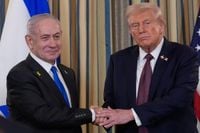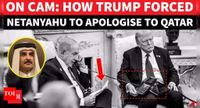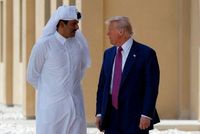In a move that has sent ripples across the Middle East and beyond, President Donald Trump has signed an executive order pledging that the United States will defend Qatar against any external attacks—including, if necessary, by military force. The order, dated September 29, 2025, but published on the White House website on October 1, comes in the wake of a dramatic Israeli airstrike on Qatari soil that killed six people, including a member of Qatar’s security forces and the son of a prominent Hamas leader.
According to Associated Press, the executive order is a direct response to the Israeli strike, which targeted Hamas leaders in Doha as they considered a possible ceasefire deal over the ongoing Gaza conflict. The attack shocked officials in both Qatar and the United States, with Qatari Prime Minister Sheikh Mohammed bin Abdulrahman Al Thani condemning it as "state terror." The New York Times reported that, while Hamas claimed no senior leaders were killed, the son of Khalil al-Hayya—a key figure in the October 2023 attack—was among the dead, along with four others and Cpl. Bader Saad al-Humaidi al-Dosari of Qatar’s internal security forces.
The executive order is explicit in its language: "The United States shall regard any armed attack on the territory, sovereignty or critical infrastructure of the State of Qatar as a threat to the peace and security of the United States," it states. Should such an attack occur, the U.S. "shall take all lawful and appropriate measures—including diplomatic, economic, and, if necessary, military—to defend the interests of the United States and of the State of Qatar and to restore peace and stability." The order also tasks the Secretary of War, Secretary of State, and Director of National Intelligence with maintaining joint contingency planning with Qatar for a rapid and coordinated response to any foreign aggression.
While the order marks a significant political gesture, questions remain about its legal and military weight. As AP points out, binding defense treaties typically require approval from the U.S. Senate. However, presidents have sometimes entered international agreements without Senate consent, as President Barack Obama did with the 2015 Iran nuclear deal. Ultimately, the decision to use military force rests with the president, a fact that has clouded previous U.S. defense commitments—including NATO’s Article 5 guarantees—during Trump’s second term.
Reaction to the executive order has been swift and divided. Qatar’s Foreign Ministry described the U.S. pledge as "an important step in strengthening the two countries’ close defense partnership," while the Qatari-funded Al Jazeera gave the news prominent coverage with the headline: "New Trump executive order guarantees Qatar security after Israeli attack." However, critics have questioned both the process and the wisdom of the move. The Wall Street Journal editorial board wrote, "This is a decision that can be and should have been debated. Instead it comes out of the blue—an executive order following no public debate." Laura Loomer, a conservative activist and fixture of Trump’s second term, bluntly posted on X, "I don’t want to die for Qatar. Do you?"
Some foreign policy experts see the order as unprecedented. Jonathan Ruhe, director of foreign policy at the Jewish Institute for National Security of America, told JNS that the order is "misguided" and "counterproductive." In his view, "It’s basically rewarding Qatar for a whole slew of policies that run counter to any understanding of U.S. interests in the region—its support for Al Jazeera, its enablement of Hamas and encouragement of Hamas’s intransigence in the Gaza negotiations." Ruhe also noted that the United States has made security guarantees with other countries before, but those arrangements have typically been reciprocal. "In this case, Qatar is getting something for nothing," he said.
Simon Henderson, Baker senior fellow at the Washington Institute for Near East Policy, told JNS that the executive order is a "huge gesture" supporting Qatar and seems to be a "slap down" of Israeli Prime Minister Benjamin Netanyahu. The timing of the executive order is notable: it was issued just after Netanyahu’s visit to Washington, during which Trump organized a call between Netanyahu and Qatari leadership. According to the White House, Netanyahu "expressed his deep regret" over the strike and told the Qatari prime minister that he did not intend to violate Qatar’s sovereignty again.
Qatar’s strategic importance to the United States cannot be overstated. The Gulf nation is home to the U.S. military’s vast Al Udeid Air Base, which hosts the Central Command’s forward operating base. President Joe Biden named Qatar a major non-NATO ally in 2022, partly due to its assistance during America’s withdrawal from Afghanistan. Qatar has also maintained close ties to Trump personally, including through real estate projects and even offering a Boeing 747 for use as Air Force One.
The Israeli strike and subsequent U.S. pledge come amid shifting security dynamics in the Gulf. Saudi Arabia recently signed a mutual defense pact with Pakistan, effectively placing the kingdom under Islamabad’s nuclear umbrella. As AP reports, other Gulf states may now seek similar arrangements with Washington, wary of both Israel’s unpredictability and renewed U.N. sanctions on Iran. "The Gulf’s centrality in the Middle East and its significance to the United States warrants specific U.S. guarantees beyond President Donald J. Trump’s assurances of nonrepetition and dinner meetings," wrote Bader al-Saif, a history professor at Kuwait University.
The true scope and durability of Trump’s pledge remain uncertain. While the executive order sends a strong signal of U.S. commitment to Qatar, its long-term effect will depend on the political will of future administrations and the evolving landscape of Middle Eastern alliances. For now, however, the message from Washington is clear: any attack on Qatar will be seen as a threat to the United States itself, and America is prepared to act—diplomatically, economically, and, if necessary, militarily—to defend its Gulf partner.
As the dust settles from the Israeli strike and the region recalibrates its alliances, the world will be watching to see whether Trump’s executive order marks the start of a new era in Gulf security—or simply the latest twist in a region long defined by shifting sands and sudden storms.



